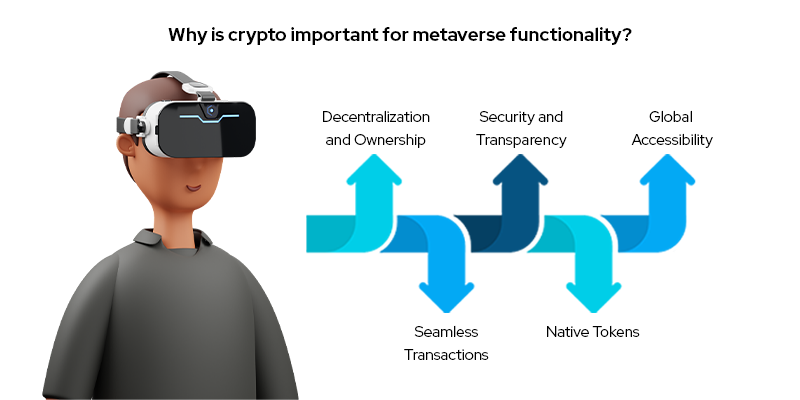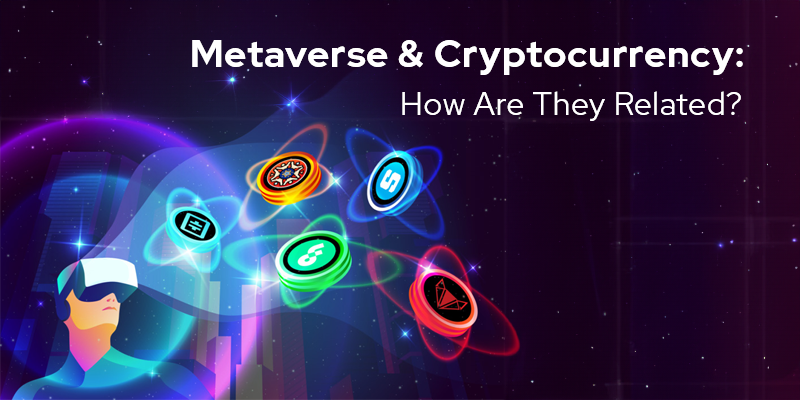Metaverse & Cryptocurrency: How Are They Related?
Introduction
This integration offers greater security, privacy, and ownership of digital assets, as cryptocurrencies are stored and transacted on decentralized blockchain networks. As the metaverse continues to evolve, the role of cryptocurrency becomes increasingly important, influencing the development of this new online world and enabling a more robust digital economy. In this blog, we will explore how cryptocurrency and metaverse are interrelated with each other. Key takeaways
A network of 3D virtual worlds with a social interaction theme is called a metaverse.
Cryptocurrencies are essential for buying virtual land, creating settings, and transacting within the metaverse.
VYUG is a metaverse platform, where reality meets realistic expectations.
What is metaverse?
The metaverse is a term used to describe a virtual reality space where users can interact with a computer-generated environment. It is a shared, immersive, persistent, 3D virtual space where humans experience life in ways they could not in the physical world. A future version of the internet consisting of shared, persistent, three-dimensional virtual spaces connected to create a perceived virtual world is called the metaverse. It's predicted that the metaverse will completely transform the digital world. The term metaverse originated in 1992. It was a science fiction novel Snow Crash as a hypothetical iteration of the Internet as a single, universal, and immersive virtual world that is facilitated by the use of augmented reality (AR) and virtual reality (VR).
Where is crypto used in Metaverse?
Firstly, crypto is used as a universal medium of exchange for virtual goods and services. Within the metaverse, users can buy, sell, and trade digital assets such as virtual real estate, in-game items, and even digital art using cryptocurrencies. Blockchain technology, which underlies most cryptocurrencies, ensures transparency and security in metaverse transactions. Smart contracts, self-executing agreements with coded terms, automate and enforce various aspects of virtual interactions, from property ownership to revenue sharing in virtual worlds. This adds a layer of trust and reliability to the metaverse economy.
Additionally, metaverse platforms often issue their native tokens, serving as the primary currency for their ecosystems. These tokens can be used for platform-specific transactions, governance, and incentives for user engagement. Users may earn, spend, or trade these tokens based on their participation and contributions to the virtual environment. As the metaverse continues evolving, cryptocurrencies will likely play an increasingly central role in shaping its economic landscape.
Why is crypto important for metaverse functionality?
Crypto is important for metaverse functionality due to several key reasons that stem from its unique characteristics and capabilities:

Decentralization and Ownership:
Cryptocurrencies operate on decentralized blockchain networks, allowing users in the metaverse to have true ownership of digital assets. This decentralization ensures that users, rather than a central authority, control their virtual possessions, virtual real estate, in-game items, or other digital assets.
Seamless Transactions:
Users can seamlessly transact, trade, and engage in economic activities across various virtual worlds without the need for complicated currency conversions or third-party intermediaries.
Security and Transparency:
The cryptographic nature of blockchain ensures a high level of security for metaverse transactions. The transparent and immutable nature of blockchain ledgers prevents fraud, and unauthorised alterations, and enhances overall trust within the virtual environment.
Native Tokens:
Many metaverse platforms issue their native tokens, creating an incentive structure for user engagement. These tokens can be earned, spent, or traded within the virtual ecosystem, driving economic activities and fostering a sense of community and participation.
Global Accessibility:
Cryptocurrencies eliminate geographic barriers, making virtual transactions accessible to users worldwide. This global accessibility enhances the inclusivity of the metaverse, allowing users from diverse backgrounds to participate in its economy. In essence, cryptocurrencies provide the foundational infrastructure that empowers the metaverse, offering ownership, interoperability, security, and innovative economic models. As the metaverse evolves, the importance of cryptocurrencies in shaping its functionality and user experience is likely to grow.
VYUG - A Metaverse Platform!
VYUG’s goal is to completely transform how we view and interact with virtual environments. VYUG allows for immersive experiences, worldwide collaboration, and boundless creativity by seamlessly fusing augmented reality, virtual reality, and the internet. It upholds a strong commitment to ethical and security principles while offering previously unheard-of chances for employment, education, and pleasure. With its connected and inclusive metaverse, VYUG offers a dynamic development in how people interact with technology and transforms how they connect, learn, and prosper in a rapidly changing digital world.
Conclusion
In 2023, the estimated value of the worldwide metaverse market was $83.9 billion. From 2023 to 2030, it is projected to expand at a compound annual growth rate (CAGR) of 48.0%. By 2030, the revenue estimate is expected to reach $1,303.4 billion. The historical data covers the years 2023 through 2030, with 2022 serving as the basis year for estimation.
As the metaverse expands and evolves, it has a promising future. From social media connections and financial breakthroughs to immersive virtual universe games, it offers a limitless virtual world of options. Accepting change can lead to fresh opportunities and a more efficient and successful financial future. Intelligent investors, consumers, creators etc can undoubtedly make money. However, it's possible to exert a great deal of work and receive nothing in return.
On the other hand, VYUG Metaverse contributes to the betterment of life across various sectors by offering innovative solutions, reducing environmental impact, improving efficiency, and promoting global connectivity. We see a world where full user-generated ecosystems exist in five years, with virtual communities that interact and transact in a decentralized way.
Written By- Manmeet Kaur

